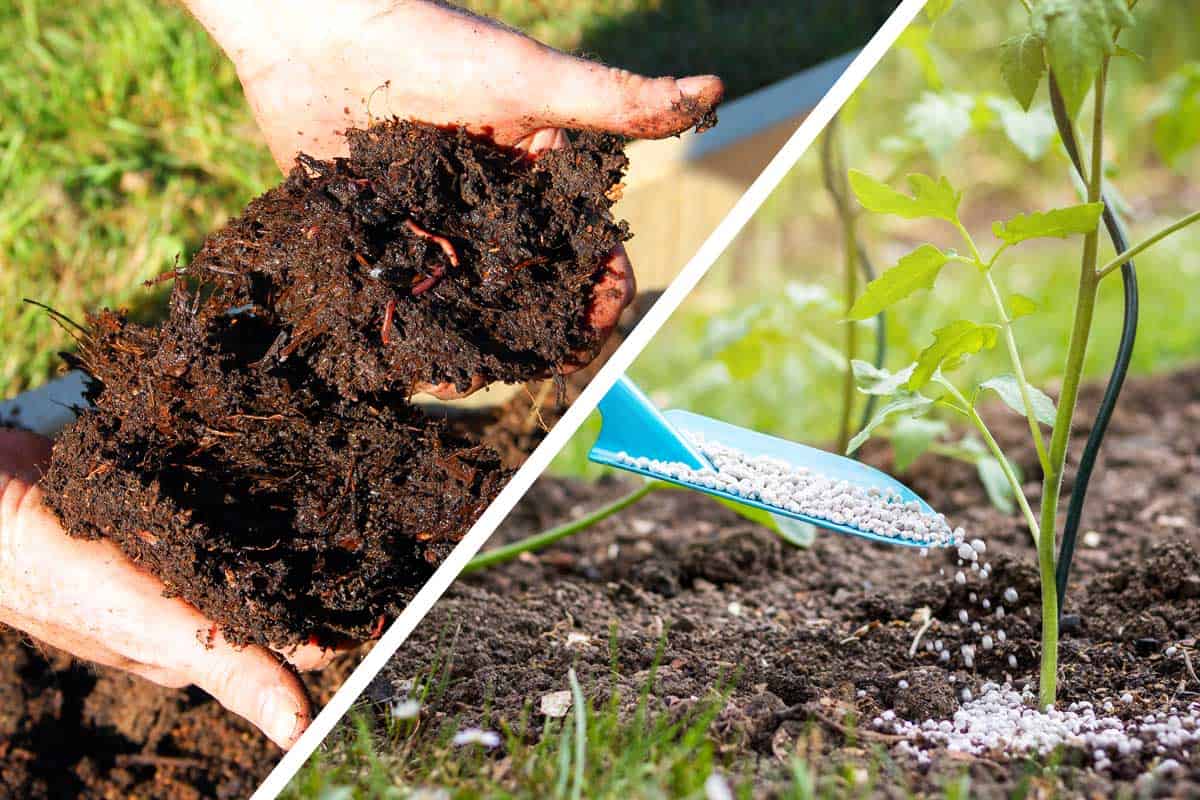In the world of agriculture, the debate between using vermicompost and chemical fertilizers has been ongoing for years. Both have their own advantages and disadvantages, but understanding the differences between the two is crucial for making an informed choice that benefits both your crops and the environment. In this article, we’ll explore how vermicompost differs from chemical fertilizers, with a focus on their composition, benefits, and impact on soil health.
What is Vermicompost?
Vermicompost is an organic fertilizer produced by the decomposition of organic material by earthworms. It is rich in essential nutrients and beneficial microorganisms, making it an excellent choice for enhancing soil fertility and promoting healthy plant growth.
- Key Components:
- Organic matter (organic material)
- Humus (सार)
- Beneficial microorganisms (लाभकारी सूक्ष्मजीव)
What are Chemical Fertilizers?
Chemical fertilizers are inorganic substances that contain essential nutrients required for plant growth. These nutrients are synthesized through chemical processes and are available in various forms such as granules, powders, and liquids.
- Key Components:
- Synthetic nutrients (सिंथेटिक पोषक तत्व)
- Salts (लवण)
- Chemical additives (रासायनिक योजक)
Nutrient Profile Comparison
Below is a table comparing the nutrient content of vermicompost and chemical fertilizers:
| Nutrient | Vermicompost (Vermi खाद) | Chemical Fertilizers (रासायनिक उर्वरक) |
|---|---|---|
| Nitrogen (N) | 1.5% | 20-40% |
| Phosphorus (P) | 0.5% | 10-20% |
| Potassium (K) | 0.8% | 10-30% |
| Micronutrients | Rich in zinc, iron, copper | Limited micronutrients |
| Organic Matter | 15-20% | None |
| Beneficial Microbes | High | None |
Key Differences Between Vermicompost and Chemical Fertilizers
1. Source and Composition
- Vermicompost is derived from organic materials such as vegetable waste, cow dung, and other biodegradable waste. It contains a balanced mix of macro and micronutrients, organic matter, and beneficial microbes that improve soil health.
- Chemical fertilizers, on the other hand, are made from synthetic chemicals and provide a quick supply of nutrients like nitrogen, phosphorus, and potassium in high concentrations. However, they lack organic matter and beneficial microbes.
2. Nutrient Release
- Vermicompost releases nutrients slowly over time, ensuring a steady supply of nutrients to plants. This slow-release mechanism helps in maintaining soil fertility and reducing nutrient leaching.
- Chemical fertilizers provide a quick and high concentration of nutrients, which can lead to rapid plant growth. However, this fast nutrient release can also result in nutrient leaching, soil degradation, and harm to beneficial soil organisms.
3. Impact on Soil Health
- Vermicompost enhances soil structure, increases water retention, and promotes the growth of beneficial microorganisms. The organic matter in vermicompost improves soil aeration and provides a habitat for earthworms and other soil fauna.
- Chemical fertilizers can lead to soil compaction, reduced water retention, and a decline in soil microbial activity. Prolonged use can degrade soil structure and fertility, making it dependent on synthetic inputs.
4. Environmental Impact
- Vermicompost is environmentally friendly and contributes to sustainable farming practices. It reduces the need for chemical inputs, minimizes pollution, and helps in waste recycling.
- Chemical fertilizers can contribute to environmental pollution, including water contamination through runoff, greenhouse gas emissions, and soil acidification. Excessive use can harm aquatic ecosystems and contribute to the problem of eutrophication.
5. Cost and Availability
- Vermicompost can be produced on the farm using locally available organic materials, making it a cost-effective option for small-scale farmers. It also reduces dependency on external inputs.
- Chemical fertilizers are widely available and offer quick results, but they can be expensive, especially for small-scale farmers. The cost of continuous use adds up over time, making it less sustainable in the long run.
Health Benefits of Using Vermicompost
Using vermicompost not only benefits the environment and soil but also has potential health benefits for consumers. Plants grown with vermicompost tend to have:
- Higher Nutrient Content: Organic farming with vermicompost can lead to crops with higher levels of essential vitamins, minerals, and antioxidants.
- Reduced Chemical Residues: Vermicompost eliminates the risk of chemical residues in crops, which can be harmful to human health.
- Improved Taste and Quality: Crops grown with vermicompost are often reported to have better taste, texture, and overall quality.
Table: Benefits of Vermicompost vs. Chemical Fertilizers
| Criteria | Vermicompost (Vermi खाद) | Chemical Fertilizers (रासायनिक उर्वरक) |
|---|---|---|
| Nutrient Availability | Slow and steady release | Quick release |
| Soil Health | Improves soil structure | Can degrade soil structure |
| Environmental Impact | Eco-friendly | Can cause pollution |
| Cost | Cost-effective | Can be expensive |
| Crop Quality | Higher nutrient content | Risk of chemical residues |
FAQs
Q1: Can I use vermicompost and chemical fertilizers together?
- Yes, you can use both together, but it’s important to maintain a balance. While vermicompost improves soil health, chemical fertilizers provide quick nutrients. However, over-reliance on chemical fertilizers can negate the benefits of vermicompost.
Q2: How much vermicompost should I use for my crops?
- The amount of vermicompost needed depends on the type of crop and soil condition. Generally, 2-3 tons per hectare is recommended for field crops, but it’s best to conduct a soil test to determine the exact amount.
Q3: Are there any crops that benefit more from vermicompost than others?
- Most crops benefit from vermicompost, but it’s particularly effective for vegetables, fruits, and flowers, as it enhances their nutrient content and taste.
Q4: How can I make vermicompost at home?
- Vermicomposting at home is simple. Start with a container, add a bedding material like shredded paper or coconut coir, introduce earthworms, and feed them kitchen scraps. Keep the compost moist and wait for the organic matter to break down into rich, dark compost.
Q5: Is vermicompost enough to meet all the nutrient needs of my crops?
- Vermicompost provides a balanced mix of nutrients, but depending on your soil and crop needs, you might need to supplement with other organic or inorganic fertilizers to meet specific nutrient requirements.
Conclusion
Choosing between vermicompost and chemical fertilizers depends on your farming goals, soil health, and environmental considerations. While chemical fertilizers offer quick results, they can have long-term negative impacts on soil and the environment. Vermicompost, on the other hand, supports sustainable farming by improving soil health, enhancing crop quality, and reducing environmental harm. By understanding the differences and benefits of each, you can make a more informed decision that aligns with your agricultural practices and goals.


Good information
Thank you so much.